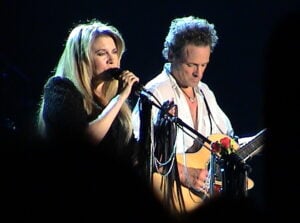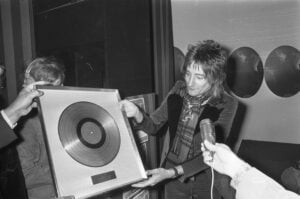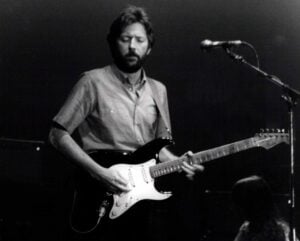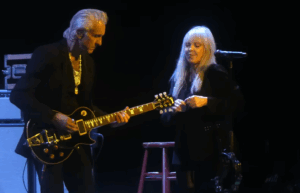The Beach Boys’ Biggest Conflicts According To Brian Wilson

via Music Mongoose / Youtube
Just because you’re family doesn’t mean you’re always going to get along—especially in a band. The Beach Boys, known for their sunny harmonies and California cool, were often dealing with serious tension behind the scenes. No one knows that better than Brian Wilson.
In one of his interviews, Brian was asked if he still talks to the band. He didn’t hold back:
“Not at all. No, I don’t like Mike Love at all, no. Because I don’t like his attitude. It is too egotistical.”
That honesty sheds light on one of the most famous feuds in rock history—Brian Wilson vs. Mike Love. But this wasn’t the only conflict in the band’s long career. Tension ran deep from the very start. Their father Murray, who managed the group early on, was a constant source of stress. Brian recalls:
“Go get in the bathroom, get in the bathroom, and then wham, wham, wham… he used to beat me in the ass. You know, it really, really, really hurt my feelings.”
When asked if he lived in fear of his father, he simply said, “Yeah…”
Let’s dive into the drama and ask the big question—whose side are you on?
Power Struggles and the Push for Control
Tension never really left the Beach Boys—not even after they found success. Al Jardine, the only non-family member, briefly left the band after their debut single due to creative differences and uncertainty about the group’s future. He was replaced by David Marks, who played on the first four albums. But by August 1963, Marks had left too—reportedly due to conflicts with Murray Wilson and money problems. Jardine rejoined soon after and returned to his original spot.
Despite the band’s growing fame, Murray Wilson, their father and manager, still tried to control every detail. He banned alcohol, swearing, and even spending time with women—charging $100 fines for breaking rules, which later jumped to $1,000 after their tour in Australia. The band finally hit their limit.
According to Mike Love’s memoir:
“Brian and I drove to his parents’ house and Brian told him straight out we can’t deal with you anymore. We’ve got to get a new manager.”
Though Brian had always struggled to confront his father, he stood his ground during a 1964 recording session and physically pushed Murray out of the studio. Still in his early twenties, Brian was producing Beach Boys albums and collaborating with other acts, such as The Honeys. But the pressure to keep the hits coming was too much—by the end of 1964, Brian had a nervous breakdown and stepped back from touring, choosing instead to focus on writing and producing.
Drugs, Pet Sounds, and a Growing Divide
While Brian Wilson stepped away from touring, Glen Campbell briefly filled in, followed by Bruce Johnston. With Brian home, he focused on creating some of the Beach Boys’ biggest hits. But that time alone brought more than music—it also brought drugs. Brian admitted:
“I started a, uh, generally what I considered a recluse period where I was confined in my bedroom. I was taking drugs. I was snorting cocaine… it’s a very bad drug, but I did, and I did it. I had a lot of money, of course—I’m a millionaire—and… I was able to get a hold of all these drugs and they messed me up… they messed my mind up.”
Eventually, Brian began experimenting with LSD. While it inspired the brilliance behind Pet Sounds, it also sparked paranoia and tension within the group. The band’s 1966 album shifted their sound from surf pop to artistic and emotional depth—something Mike Love wasn’t entirely on board with. Mike said:
“My cousin, Brian, really had the time… to devote to his production techniques… but he overdid it with some LSD and so on, so that set him back mentally and emotionally.”
Mike and Al thought the album was too “arty,” and Mike worried Brian was drifting into solo territory—especially when “Caroline, No” was released under Brian’s name alone. Still, Pet Sounds would go on to define the Beach Boys’ legacy, with Dennis and Carl insisting the whole band respected Brian’s vision.
From “Good Vibrations” to a Creative Meltdown
After Pet Sounds, Brian Wilson stayed with the Beach Boys—at least for a while. Motivated by his friendly rivalry with the Beatles, especially Paul McCartney, and his own desire to be seen as a musical genius, Brian set out to top himself. That’s when he created the groundbreaking “Good Vibrations,” with Mike Love writing the lyrics and delivering those signature deep vocals. Mike later admitted he was nervous about how fans would take to the psychedelic sound, but said the song’s universal message helped it succeed. The track reached No. 1, and Brian proudly recognized his bandmates’ input, saying they all wanted to move beyond surf and car songs to make lasting music.
Still, “Good Vibrations” would be their high point. Brian poured himself into the Smile album with lyricist Van Dyke Parks, but perfectionism, drug use, and internal tension caused delays. Mike Love reportedly called some of the lyrics “acid alliteration.” Eventually, Smile was shelved, and the group released the simpler Smiley Smile instead.
From there, Brian’s creative grip loosened. Wild Honey credited the full band, with Brian and Mike co-writing much of it. By the time Friends came along, the group was more fragmented, with Dennis Wilson and poet Steven Kalinich joining the creative mix.
Manson, Departures, and a Decline
By 1969, Brian Wilson had checked into a psychiatric hospital, leaving the rest of the Beach Boys to complete their album 20/20. One of its tracks, “Never Learn Not to Love,” was officially credited to Dennis Wilson but was actually based on “Cease to Exist,” a song written by cult leader Charles Manson. Dennis had a troubling connection to Manson at the time. Al Jardine recalled the tension, saying Dennis “wanted to include Manson’s mantra-like melody in various songs.” When the lyrics were changed, Manson threatened Dennis, ending their association.
In 1972, Bruce Johnston—who had joined in 1965 and helped on albums like 20/20, Sunflower, and Surf’s Up—left the group. Mike Love called it “amicable,” with Bruce wanting to focus on solo work. Johnston later admitted he was unhappy with Brian’s fading involvement and feared becoming part of an “oldies act.” U.S. success slowed until Endless Summer revived their fame in 1974, even as Brian remained distant.
Brian’s Return, Rivalries, and the Battle Over “Kokomo”
In late 1975, Brian Wilson began treatment with psychiatrist Eugene Landy—a partnership that would later turn controversial. Still, Brian initially regained some stability. He earned sole production credit on the 1976 album 15 Big Ones, which sold well despite harsh reviews, and even returned to touring. While Dennis Wilson focused on solo work like his acclaimed 1977 album Pacific Ocean Blue, Brian was ready to explore his own solo project, Brian Loves You. But band tensions got in the way.
Though Brian wrote most of the songs and played most instruments, vocals were split among the group, resulting in the release of The Beach Boys Love You in 1977. Brian defended the album, and fans today see it more positively, but at the time, it flopped. Disheartened, he stepped back again.
The band struggled with addiction, management battles, and growing division. In 1983, things got so bad that Mike Love and Dennis Wilson filed mutual restraining orders.
As Brian remained isolated under Landy’s control, Kokomo became a hit—but not without drama. Mike Love recalled:
“We tried to get him to record with us on that song but he was under the tutelage… or under the spell, as some people would say, of Dr. Landy… Landy wouldn’t let Brian record with us. Only if Landy could be the co-writer or co-producer… but we had Terry Melcher as the producer…so Eugene kept him away… What happened, though—we did a video in Florida of Kokomo, and Brian was in the video, but he wasn’t on the record.”
It was another reminder that even at their peak, the Beach Boys were never free from behind-the-scenes chaos.
Lawsuits, Losses, and a Late Comeback
In 1992, Brian Wilson released his memoir Wouldn’t It Be Nice: My Own Story, which sparked a wave of lawsuits from Mike Love, Carl Wilson, and their mother, Audree. Mike Love settled for $1.5 million for defamation and, in 1994, won $13 million in lost royalties—plus co-writing credits on 35 Beach Boys songs, including the classic “I Get Around.” Love later claimed Brian was involved in “almost certainly the largest case of fraud in music history” over song credits. After legal battles in the ’90s, Mike Love gained full control of the Beach Boys’ name.
Meanwhile, Brian was freed from Eugene Landy’s grip after a judge ruled against Landy, who had manipulated him into changing his will—leaving 70% of his estate to the therapist. Following Carl Wilson’s death, legal troubles continued, but Brian made a comeback. He toured solo and released Brian Wilson Presents Smile in 2004. Mike Love later sued him over Beach Boys re-recordings—but lost.
Short-lived Reunion, The Rifts and Political Fallout
In 2011, Brian Wilson Presents Smile paved the way for The Smile Sessions and a much-celebrated Beach Boys reunion in 2012. Brian Wilson, Mike Love, Al Jardine, Bruce Johnston, and David Marks came together to release That’s Why God Made the Radio, a fresh album that fans loved. But the harmony didn’t last. Love and Johnston continued touring as the Beach Boys, while Wilson, Jardine, and Marks performed separately under Brian’s name.
In July 2018, the group reunited briefly for a Q&A at Capitol Records in L.A. Mike Love expressed hope to work with Brian again, but that faded fast. By February 2020, Love’s Beach Boys played at a Safari Club International event, a group known for supporting trophy hunting. Brian Wilson strongly opposed it, stating their “opposition to trophy hunting” and backing a petition that drew nearly 80,000 signatures.
The split deepened when Love’s band played a Trump fundraiser in October 2020, without Wilson or Jardine’s knowledge.
A Sweet Reunion Before Goodbye
It seemed like the decades-long feud between Brian Wilson and Mike Love would never end—until 2024 brought a surprising shift. After Brian was placed under a conservatorship due to dementia, following the death of his wife Melinda, something softened. That same year, The Beach Boys documentary premiered on Disney+, reuniting the band at Paradise Cove—the spot of their first album cover.
Mike Love shared:
“Brian was remembering things from our high school days that I had forgotten… And then we sang a little bit of a cappella ‘Their Hearts Were Full of Spring,’ we sang some ‘Fun, Fun, Fun’… it was just very sweet. That was true. It showed the true love between us.”
Bruce Johnston added:
“I think once Brian and Mike sit around the piano and just the magic… you can’t stop it.”
Love added:
“It’s a brand new day now, and I’m hoping we can do something together.”
Sadly, Brian Wilson passed away on June 11, 2025. As much as everyone hoped for one last true Beach Boys reunion, that chapter has now closed for good.













